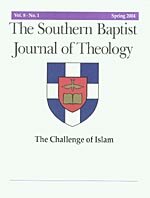Back to Towers Online  E-mail Story
E-mail Story
New SBJT sheds light on Islam
June 03, 2004
By Jeff Robinson
 |
|
The Southern Baptist Journal of Theology |
Before Sept. 11, 2001, Islam was but a blip on the religious radar screen of most Americans.
But today the world's second largest religion is on the minds of many people, particularly those in the evangelical church, yet few understand its history or its theology.
Essayists in the Spring edition of The Southern Baptist Journal of Theology seek to shed light on the fundamental tenets of Islam, examining key aspects of the faith from its doctrine of "Jihad" to its teaching on Jesus.
Contributors include Southern Seminary professors Chad O. Brand, James Chancellor and George Martin, as well as guest scholars Norman Geisler, Emir and Ergun Caner, Amar Djaballah, and Richard Patterson.
"Even though Islam is the only major religion to emerge after Christianity, and is the second largest religion in the world (and growing rapidly), and has been in conflict with Christianity for centuries, it took the tragedy of that day to bring Islam to forefront of our minds," SBJT editor Stephen J. Wellum writes in his editorial.
"In spite of all the attention given to Islam since 9/11, however, it is clear from much of the conversation about Islam, both outside and sadly, inside the church, that we lack a basic understanding of Islam and the challenges it presents."
In his essay, Brand, associate professor of Christian Theology, offers a primer on the basic history and beliefs of Islam. After briefly building the historical foundation of Islam, Brand sets forth the "Five Pillars of Doctrine" alongside the "Five Pillars of Practice," that compose the core of Muslim doctrine and ethics.
Brand points out that one of the major differences between the Christian God and the god of Islam, "Allah," is the idea of relationship between deity and people.
"Allah has no interest in entering into a personal relationship with humans, nor does he even have the ability to do so since his distance from the created world makes such an experience a metaphysical impossibility. There is a vast difference between the Muslim god and the God of the Bible, who is the God and Father of Jesus Christ."
Chancellor, W.O. Carver Professor of Christian Missions and World Religions, brings 25 years Islamic research and experience to his reflections on Islam and violence. Chancellor has studied Islam for the past 25 years, has visited numerous Islamic nations and has lived in Egypt, Nigeria, Malaysia, and the Philippines.
At its heart, Islam is not a religion of peace as President George Bush and popular commentators have declared in the wake of the 9/11 attacks on the United States, Chancellor writes. "Jihad" is clearly a foundational component of the Islamic faith, he writes.
"President George Bush was rightly motivated when he declared Islam to be a religion of peace and that the September 11 terrorists had 'hijacked' Islam," Chancellor writes. "He hoped to prevent unjust retaliation against innocent Muslim people living in the United States and to attempt to dispel the notion that the coming response to the September 11 tragedy would be an attack against Islam.
"However, right motivation does not necessarily lead to right observation. Islam is not a religion of peace. There are a number of internal dynamics that create strong predilections toward the use of force and violence to make the Islamic vision a reality on the earth."
Reports of dreams and visions in which Jesus appears to people saying "I am the way," are streaming out of Islamic lands, Martin reports in his essay. Martin is M. Theron Rankin Professor of Christian Missions and the Associate Dean of the Billy Graham School of Missions, Evangelism and Church Growth.
A veteran missionary in Southeast Asia, Martin analyzes the reports of "Jesus dreams" among Muslims, concluding that Scripture must always be the standard against which all phenomena are measured. Martin also considers the implications of dreams for the task of missions.
"Clearly, one must proceed with caution rather than at a dangerous, full-throttle speed," Martin writes of embracing dreams as bonafide communication from God.
"Those who are concerned to present a genuine Gospel witness must always be concerned about distinguishing between the genuine voice of God and that which is counterfeit
Dreams must never be understood as having parity with the Scriptures. Only the Bible provides an absolutely trustworthy and authoritative word from God."
The Caner brothers, both of whom were raised within the Islamic faith, examine the doctrine of Jihad in the "Hadith" (the commandments of Islam's founder, Muhammed), Geisler compares and contrasts Jesus and Muhammed in the Qur'an, Djaballah investigates Jesus in Islam, and Patterson looks at the biblical theme of darkness.
The journal also includes a number of book reviews and the SBJT forum which discusses the issues key to understanding both Islam and its adherents. For more information on the SBJT, please contact the journal office by phone at (ex. 4413) or by e-mail at .
© 2004, The Southern Baptist Theological Seminary - All Rights Reserved
Home | Contact Us | Reprint Permission